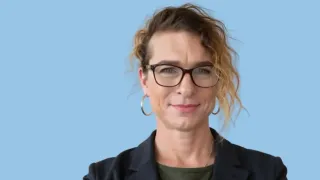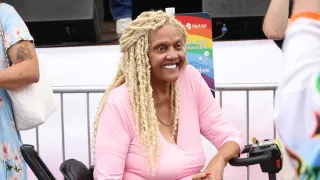May 31, 2015
Opening Date Set for LGBT Shelter
Kilian Melloy READ TIME: 5 MIN.
An opening date for a long-awaited homeless shelter in San Francisco specifically designed to be safe for LGBT adults has been set for Wednesday, June 17.
After more than five years of permit, funding, and other delays, word came last week that the 24-bed space at 1050 South Van Ness Avenue is almost ready.
Brian Basinger, who's pushed for the shelter for years and is the director of AIDS Housing Alliance/San Francisco, announced the opening date in a Facebook post Friday May 22.
The shelter will be called Jazzie's Place, after Jazzie Collins, a transgender woman who advocated for housing, seniors, and other issues and died in 2013. Dolores Street Community Services, which already operates a shelter at the South Van Ness site, will also run the LGBT shelter, which is located in a renovated space at the building.
Advocates and elected officials have been pushing for the shelter since a March 2010 Board of Supervisors hearing in which several LGBTs told of harassment they had experienced at the city's shelters.
Since then, the project has been mired in city bureaucracy, with many of the hurdles related to obtaining permits from city agencies. Additionally, money for the project was slow to come, despite the relatively small amount needed.
In an interview Friday, Basinger said the impact of Jazzie's Place for residents "is beyond just the safe, dignified, and welcoming shelter for the individuals who'll be accessing those services. The broader impact is really, in a very concrete way, demonstrating the need for LGBT-focused safety net services, and really bringing those needs out of the shadows and casting light on those in our community who are suffering."
Basinger referred to the most recently available census data on homeless people in the city. In June 2013, the biennial homeless point-in-time data were released and, for the first time, included statistics on LGBT people. The report found that out of a total of 7,350 homeless people, more than one in four (29 percent) identified as lesbian, gay, bisexual, or "other," for a total of 2,132.
"Once again, San Francisco will be leading the way for the nation," Basinger said, but "29 percent of the city's homeless population is LGBT," and the shelter has only 24 beds.
"Hopefully we can use that as an advocacy tool to continue to demand our fair share," he said.
Lottery System
Basinger indicated details haven't been finalized for the June 17 grand opening, but he said shelter residents will move into the space that night.
Residents will be selected through a lottery system.
In response to emailed questions, Dolores Street Executive Director Wendy Phillips said the details of that process "are still being worked out, so we are not releasing this information publicly yet. We are shooting for June 8 as the first day people can start entering" the lottery.
Phillips said residents will be able to stay for up to 90 days and may be able to extend that an additional 30 days.
People "who are not selected in the initial lottery will remain on a waitlist and will be contacted when a slot opens up," she said.
In order to be included in the lottery, people first have to have a profile in the city's centralized shelter database and be tested for tuberculosis, Basinger said. He said people could start those processes at Mission Neighborhood Resource Center at 165 Capp Street. That information couldn't be confirmed with the agency Friday.
Jazzie's Place will include bunk beds and bathrooms and is separated into three gender-specific mini pods. Partitions separate the beds. The gender categories will be male, female, and non-conforming, and there will be eight beds available in each.
"When someone signs up for the waitlist, they will be able to select which space or spaces they would like to stay in," Phillips said. "However, the male-identified and female-identified spaces would only be for male-identified or female-identified individuals."
Dolores Street's shelter space has three rooms. Two of those spaces will house the current population, "which is all men," Phillips said. The new LGBT space will operate in the third room.
Each of the three rooms "will have one shelter monitor at a time," she said.
" ... We have been and continue to focus on hiring LGBT individuals for all shelter monitor positions, and our goal will be to assign an LGBT person to the LGBT space. Hiring is still in process for new staff to accommodate the expansion," Phillips said.
The $163,000 in operating funding for the LGBT space comes from the city's Human Services Agency and will be combined with Dolores Street's current contract to operate its other three shelters, Phillips said.
The shelter can't deny access to non-LGBTs based on their orientation.
Basinger said they're working to make clear to people "what the shelter is, and the kind of environment we're creating there, but there's no way you can - or would we want to - deny somebody access to shelter because they're not LGBT. It's in the affirmative marketing."
"A passageway"
Housing activist Tommi Avicolli Mecca, who like Basinger has been advocating for the shelter for years, said, "We've taken a lot of pains to make sure this is going to be a safe space for LGBT folks," and "for people to come in off the streets. Hopefully, it will be a passageway to permanent housing and other things in their lives."
Avicolli Mecca added, "It was frustrating that it took so long. Part of that is on the city, and how the city operates."
He said that while "the city did help a lot" in getting the shelter open, "we've got to remember this came from the community. It came from a very real need in our community."
Bevan Dufty, a gay man who serves as director of Housing Opportunity, Partnerships and Engagement for Mayor Ed Lee and who's been a strong backer of the shelter, echoed Avicolli Mecca's remarks.
"This shelter is community-driven, and activists fought and stayed the course to make it happen," Dufty said. He added, "This is so much more than 24 beds. This is a recognition that our services have not always been accessible to members of the LGBT community, because of hostility and ignorance. This is about a system recognizing the unique needs of LGBT individuals, particularly to be safe and welcomed."
Gay Supervisor David Campos, whose District 9 includes the shelter and who called for the 2010 hearing, didn't respond to requests for comment.
Phillips said that along with Dufty, Campos' staff "have been critical to advancing this project and ensuring that the shelter opens" in June. "They helped significantly to ask city departments to make this project a priority, and deserve a lot of credit for bringing the project to fruition."






